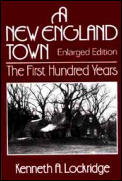Kenneth Lockridge and the New Social History
Kenneth A. Lockridge died last month at the age of seventy-nine. He was Professor Emeritus of History at the University of Montana, having previously taught at the University of Michigan and the University of Illinois, Chicago.
Lockridge’s first book, published in 1970, was A New England Town: The First Hundred Years: Dedham, Massachusetts, 1636–1736.
It was one of a bevy of studies of rural New England communities published in the 1970s, including John Demos’s A Little Commonwealth, Michael Zuckerman’s Peaceable Kingdoms, and Philip J. Greven’s Four Generations.
Robert A. Gross applied and extended that approach in The Minutemen and Their World, about Concord in the Revolutionary period.
This “new social history” focused on the lives of ordinary men and women rather than political elites, on long-term social and economic trends rather than individual narratives. Eventually it was no longer new, and younger historians developed other approaches, such as looking at the experiences of people who weren’t ordinary because of race, sex, or other factors.
Lockridge went on to write such books as Literacy in Colonial New England, Settlement and Unsettlement in Early America, and On the Sources of Patriarchal Rage: The Commonplace Books of William Byrd and Thomas Jefferson and the Gendering of Power in the Eighteenth Century.
He also published studies of Sweden, his wife’s home, and after retirement moved to that country to be with family.
The University of Montana has named its workshop for historical works in progress after Lockridge.
Lockridge’s first book, published in 1970, was A New England Town: The First Hundred Years: Dedham, Massachusetts, 1636–1736.
It was one of a bevy of studies of rural New England communities published in the 1970s, including John Demos’s A Little Commonwealth, Michael Zuckerman’s Peaceable Kingdoms, and Philip J. Greven’s Four Generations.
Robert A. Gross applied and extended that approach in The Minutemen and Their World, about Concord in the Revolutionary period.
This “new social history” focused on the lives of ordinary men and women rather than political elites, on long-term social and economic trends rather than individual narratives. Eventually it was no longer new, and younger historians developed other approaches, such as looking at the experiences of people who weren’t ordinary because of race, sex, or other factors.
Lockridge went on to write such books as Literacy in Colonial New England, Settlement and Unsettlement in Early America, and On the Sources of Patriarchal Rage: The Commonplace Books of William Byrd and Thomas Jefferson and the Gendering of Power in the Eighteenth Century.
He also published studies of Sweden, his wife’s home, and after retirement moved to that country to be with family.
The University of Montana has named its workshop for historical works in progress after Lockridge.


No comments:
Post a Comment